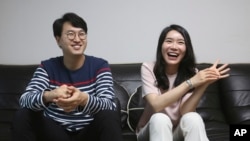A year ago, Kim Seo-yun gave some very important personal information to her South Korean love interest.
She had fled North Korea about 10 years earlier.
Kim provided the information on her second date with Lee Jeong-sup.
Lee asked jokingly if she was a spy. He then told her there was nothing wrong with coming from North Korea.
Kim and Lee got married at a Seoul hotel in June. But Kim’s family, still in North Korea, could not attend the wedding ceremony.
“In South Korea, my husband is my everything. I have no one else here. He told me that he would play the role of not only my husband but also my parents,” Kim said.
Such marriages are becoming increasingly common in South Korea.
More than 70% of the 33,000 North Koreans who have fled to South Korea are women.
There are no official numbers on how many North Koreans have married South Korean men. But a 2019 government-financed study looked at 3,000 North Koreans living in the South. The findings suggested that 43% of married women from North Korea had South Korean husbands. In 2011, that number was about 19%.
North Korean women often have difficulties adjusting to life in South Korea. They often face discrimination and loneliness.
Some said they married South Korean men to help them with their new lives.
“I feel like my marriage is letting me acclimate to this society more deeply without too much hard work,” said Hwang Yoo-jung about her 2018 marriage to a South Korean man.
Many women who flee North Korea turn to matchmaking agencies – companies that help North Korean women meet South Korean men. Often run by North Koreans, the companies charge South Korean men around $2,500 for several blind dates in a year. Most women do not have to pay.
Around 20 to 30 matchmaking agencies operate in South Korea. In the mid-2000s, there were only two such businesses.
Kim Hae-rin heads a match-making agency in Seoul.
Kim said she feels happy to help people meet “because I also came here alone and know (the suffering) of other refugees.”
Some of the couples, however, have difficulties. They share a language and ethnicity, but they can often seem like foreigners to one another. They are, after all, attempting to bridge a 75-year-old division of the Korean Peninsula.
Lee said he tries to use fewer English words while speaking with his wife. She sometimes confuses him by using North Korean expressions that he does not understand.
Hwang said that she feels “really, really happy” when her husband Seo Min-seok, takes her to a gathering of his friends and their wives. She says they often ask her questions about North Korea.
Seo said he does not usually ask Hwang about her past in North Korea.
Ahn Kyung-su is a researcher with a private group that studies health issues in the North. Ahn said some of the North Koreans that he has spoken to have told him that their South Korean husbands looked down on them and abused them.
Kim Seo-yun said she misses her parents and younger sister in North Korea and hopes to reunite with them one day.
“Now, my husband is filling my heart. My mother-in-law treats me well. So does my sister-in-law. It’s like having strong supporters in my life, and I’m happy now,” Kim said.
I’m John Russell.
Hyung-Jin Kim reported on this story for the Associated Press. John Russell adapted it for VOA Learning English. George Grow was the editor.
_______________________________________________________________
Words in This Story
date – n. an occasion when two people who have or might have a romantic relationship do an activity together
role – n. the part that someone has in a family, society, or other group
adjust – v. to change in order to work or do better in a new situation
acclimate – v. to adjust or adapt to a new climate, place, or situation — usually + to
blind date – n. a date or social activity between two people who have not previously met before
couple – n. two people who are married or spend a lot of time together
confuse – v. to identify wrongly; to mix up
in-law – n. a relative by marriage






